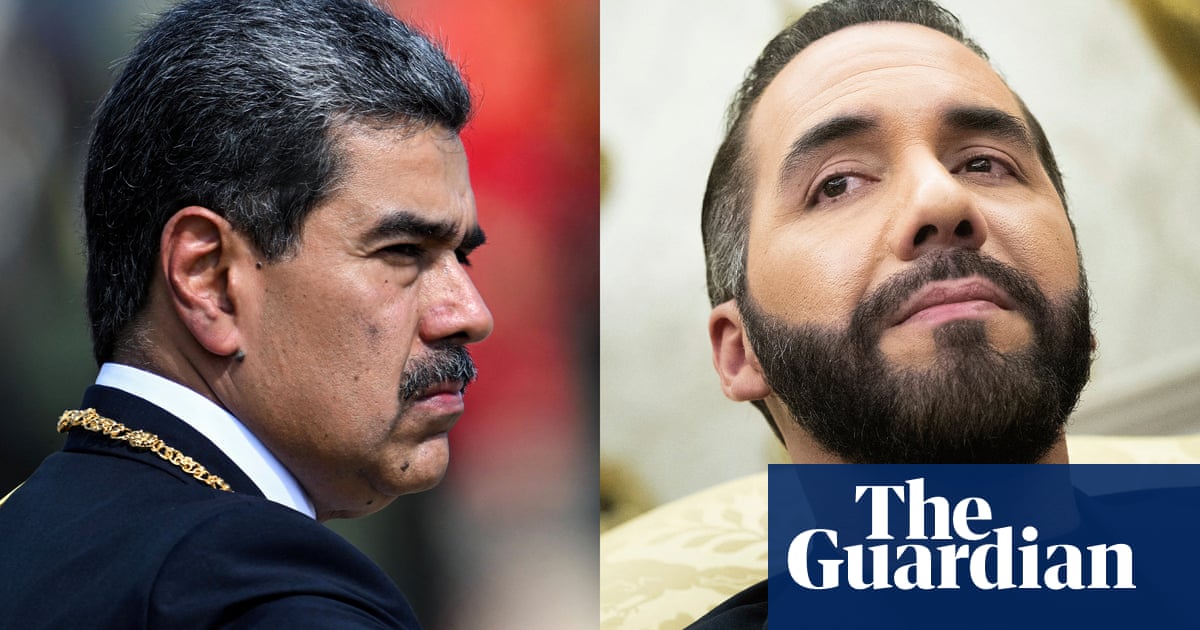Venezuela’s chief prosecutor has accused El Salvador’s president of being a “tyrannical” human trafficker after Nayib Bukeleoffered to exchangethe 252 Venezuelan migrants deported to his country’s prisons by Donald Trump for the same number of political prisoners in Venezuela.
Bukele made the offer on Sunday night in a message addressed directly to his authoritarian counterpartNicolás Maduro. “I want to propose a humanitarian agreement that includes the repatriation of 100% of the 252 Venezuelans who were deported, in exchange for the release and delivery of an identical number … of the thousands of political prisoners that you hold,” El Salvador’s leader posted.
Hours later the proposal was rebuffed by one of Maduro’s top allies, the attorney general Tarek William Saab. In a televised address, Saab claimed the Salvadorian’s “cynical” offer exposed him as a narcissistic “neo-Nazi” who had “kidnapped” more than 250 Venezuelan migrants sent to a maximum-security jail inEl Salvadorby the Trump administration since mid-March.
“Bukele is a serial human rights violator,” Saab said, pointing to the politician’s “horrifying” three-year anti-gang crackdown which has seen at least 85,000 Salvadoriansthrown in jail, largely without due process. Human rights activists say more than 360 prisoners have died.
Some members of Venezuela’s opposition – reeling from its failure to dislodge Maduro, despite seemingly beating him in last July’s presidential election – welcomed Bukele’s offer. Leopoldo López, an exiled opposition leader who lives in Spain, said the idea had his “full support”. The opposition’s most important leader,María Corina Machado, made no immediate comment.
However, many political and human rights activists have voiced perplexity and shock that the Venezuelan migrants being held in El Salvador – having been denied due process in the US and deported to an authoritarian foreign land – had become embroiled in the political tussle between strongman populists such as Trump, Bukele and Maduro.
“The idea that there would be a [prisoner] trade should be loathsome to anyone who actually cares about human rights,” said Christopher Sabatini, a senior fellow for Latin America at Chatham House.
Geoff Ramsey, a Venezuela expert from the Atlantic Council’s Adrienne Arsht Latin America Center, suspected the plight of the Venezuelans being held in El Salvador and Bukele’s prisoner swap “PR stunt” had potential benefits for both Bukele and Maduro.
“Maduro’s quite happy to feud with Bukele and point to human rights abuses in El Salvador as a way of distracting from the brutal repression and violence of his own regime,” Ramsey said. According to the human rights group Foro Penal, Maduro’s jails currently house about 900 political prisoners. Thousands were imprisoned after last year’s election when Maduro, who has ruled since 2013, ordered acrackdownto stop his apparent victor, Edmundo González, taking power.
From Bukele’s perspective, offer was “a smart way of shifting the conversation away from concerns around the deportees being held in El Salvador back to the existence of political prisoners in Venezuela”, Ramsay said.
For the migrants caught up in the geopolitical jailings, the consequences are calamitous. Many have not been convicted of any crime and it is unclear how long they will be held.
In an interview last week, the wife of one Venezuelan prisoner, a singer called Arturo Suárez Trejo, lamented how the Venezuelan detainees seemed to have become part of a high-stakes game of chess. “And they are the pawns,” said Nathali Sánchez, rejecting claims that the father of her child was involved in crime. “It’s evil,” she added.
The Trump administration’s targeting of Venezuelan migrants – who it has accused, largely without evidence, of being gang members and terrorists – has put Venezuela’s opposition in a difficult spot.
Seemingly fearful of alienating Trump’s administration, its key leaders – including including Machado – have said little about the migration crackdown or the deportation of Venezuelan citizens to El Salvador. “[The opposition has] largely held its tongue on issues of the treatment of fellow citizens because of its larger goal of gaining the White House’s support for its preferred strategy [to defeat Maduro] and that also is reprehensible,” Sabatini said.
Among the friends and families of the incarcerated migrants – many of them opposition supporters who fled Venezuela to escape Maduro’s regime – the opposition’s failure to defend them is causing anger and frustration.
“The reality is that the Venezuelan opposition needs to have a good relationship with the White House, and they understand that they can’t be perceived as criticizing Trump,” said Ramsey. “But on the other hand, the general public in Venezuela is outraged at the situation faced by those who’ve been deported and sent to this maximum security jail in El Salvador. So it really puts the opposition in between a rock and a hard place.”
